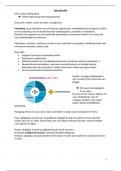Notas de lectura
Class notes - Work Psychology
- Grado
- Institución
- class notes from Work Psychology course - all lectures included (except for guest lecture) - in order to complete the exam successfully, besides reading these class notes, I recommend also reading the book
[Mostrar más]





